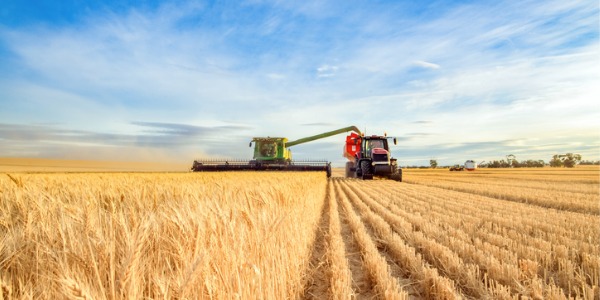What is a Crop Farmer?
A crop farmer grows plants for food, animal feed, fuel, or industrial use. They manage everything from preparing the soil and planting seeds to watering, fertilizing, and harvesting. Common crops include corn, soybeans, wheat, fruits, and vegetables. Crop farmers often use modern equipment and technology to help improve yields and monitor things like soil quality and weather patterns.
In addition to working in the fields, crop farmers also handle tasks like managing budgets, maintaining machinery, and selling their harvest to markets, distributors, or food manufacturers. Whether they run small family farms or manage large commercial operations, crop farmers play an essential role in feeding communities and supporting the economy.
What does a Crop Farmer do?

Duties and Responsibilities
The duties and responsibilities of a crop farmer can vary depending on the size of the farm, the type of crops grown, and the season. However, common responsibilities include:
- Soil Preparation: This involves plowing, tilling, and fertilizing the land to create the best possible environment for seeds to grow. Proper soil preparation helps improve crop yields and supports healthy plant development.
- Planting: Crop farmers carefully select the right seeds or seedlings and plant them at the optimal time of year. Timing and proper planting techniques are crucial to ensure good germination and strong growth.
- Crop Management: Throughout the growing season, farmers monitor the crops closely. They irrigate the fields when necessary, apply fertilizers and pesticides to protect and nourish plants, and control weeds and pests to prevent damage.
- Harvesting: When crops reach peak ripeness, farmers use machinery or sometimes manual labor to harvest them efficiently. They also prepare the crops for storage or transport to markets, ensuring quality is maintained.
- Equipment Maintenance: Regular inspection and upkeep of tractors, harvesters, and other farm equipment is essential. Proper maintenance prevents breakdowns, improves safety, and extends the life of costly machinery.
- Recordkeeping: Keeping detailed records of crop yields, weather patterns, input costs, and sales helps farmers make smart decisions. This information is vital for managing the farm’s productivity and profitability.
- Marketing and Sales: Farmers often work to sell their crops to wholesalers, food processors, or directly to consumers through farmers’ markets or cooperatives. Effective marketing strategies help maximize income and build customer relationships.
- Sustainability Practices: Many crop farmers implement methods that protect soil health, conserve water, and reduce environmental impact. Sustainable farming supports long-term productivity and helps preserve natural resources for future generations.
Types of Crop Farmers
There are different types of crop farmers, each specializing in growing particular kinds of crops or using specific farming methods. Understanding these types helps highlight the variety of roles within crop farming:
- Organic Farmers: Focused on sustainable and chemical-free farming practices, organic farmers grow crops without synthetic pesticides or fertilizers. Their methods emphasize soil health, biodiversity, and environmental stewardship.
- Grain Farmers: These farmers focus on growing cereal crops such as wheat, corn, barley, and oats. Their work often involves large-scale planting and harvesting to supply food, animal feed, and industrial products.
- Vegetable Farmers: Specializing in growing vegetables like tomatoes, carrots, lettuce, and peppers, these farmers often work on smaller plots or greenhouses and may sell their produce directly to local markets or restaurants.
- Fruit Farmers (Orchardists): These farmers cultivate fruit trees or berry bushes, producing apples, oranges, strawberries, and other fruits. Fruit farming requires careful management of orchards and knowledge of seasonal cycles.
- Specialty Crop Farmers: These farmers grow niche or high-value crops such as herbs, flowers, nuts, or exotic fruits. Their farms might be smaller and often target specialty markets or direct-to-consumer sales.
What is the workplace of a Crop Farmer like?
The workplace of a crop farmer is usually outdoors on farmland, where they spend much of their time working in fields or greenhouses. The size of the farm can vary—some crop farmers work on large commercial farms with hundreds of acres, while others manage smaller family-run plots. The work can be physically demanding and often depends on the weather, with long hours during planting and harvest seasons.
Crop farmers also spend time operating and maintaining farm machinery, such as tractors, planters, and harvesters. These machines help with tasks like preparing the soil, planting seeds, spraying crops, and collecting the harvest. In addition to fieldwork, farmers may need to store equipment and crops in barns or sheds and manage irrigation systems to ensure crops get enough water.
Some work is also done indoors, especially during the off-season. Farmers may plan for the next growing cycle, order supplies, track finances, and handle marketing or sales from a home office. Whether in the field or indoors, crop farmers must balance hands-on labor with careful planning to keep their farms productive and successful.
Frequently Asked Questions
Farming-Related Careers and Degrees
Careers
- Alligator Farmer
- Agricultural Engineer
- Agricultural Worker
- Agronomist
- Aquaculturist
- Artisanal Dairy Farmer
- Beekeeper
- Certified Crop Advisor
- Chicken Sexer
- Commercial Dairy Farmer
- Crop Farmer
- Dairy Farmer
- Dairy Farm Worker
- Farm Equipment Mechanic
- Dairy Scientist
- Farmer
- Family Dairy Farmer
- Farm Manager
- Grain Elevator Worker
- Livestock Farmer
- Livestock Feed Sales Representative
- Organic Dairy Farmer
- Organic Farmer
- Poultry Farmer
- Poultry Scientist
- Rancher
- Robotic Dairy Farmer
- Vermiculturist
Degrees
- Agribusiness
- Agricultural Mechanics
- Agriculture
- Agronomy
- Animal Sciences
- Aquaculture
- Crop Production
- Dairy Science
- Equine Science
- Poultry Science
- Soil Science